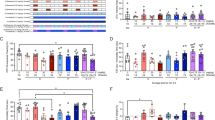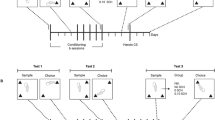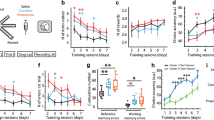Abstract
Stress is associated with relapse to drugs after abstinence, but the mechanisms for this association are unclear. One mechanism may be that stress enhances abstinent addicts’ recall of memories of drugs as stress relievers. This study assessed the effects of stress on free recall and cued recall of 10 heroin-related and 10 neutral words learned 24 h earlier by 102 abstinent heroin addicts. These participants were randomly assigned to three experiments that also assessed attention and working memory. Experiment 1 used a psychosocial stressor (Trier social stress test (TSST)) before testing for recall of heroin-related words. Experiment 2 added administration of the β-adrenoceptor antagonist propranolol 1 h before the psychosocial stressor. Experiment 3 added administration of either cortisol with propranolol, cortisol alone, or propranolol alone 1 h before word recall to determine whether stress enhancement of heroin-related word recall required noradrenergic-glucocorticoid interactions. We found that free recall of heroin-related words in abstinent addicts was enhanced after stress or cortisol administration when compared with a non-stress condition or placebo, respectively, whereas these interventions had no effect on neutral word recall. β-adrenergic blockade blocked the enhancing effect of stress or cortisol on free recall of heroin-related words. Neither stress nor cortisol affected cued recall, attention, or working memory. The potential of β-adrenergic blockade to reduce or block stress-induced enhancement of drug-related memory retrieval may be relevant to preventing stress-induced relapse in abstinent heroin addicts.
Similar content being viewed by others
Log in or create a free account to read this content
Gain free access to this article, as well as selected content from this journal and more on nature.com
or
References
Adolphs R, Tranel D (2000). The Amygdala 2nd edn. Oxford University: New York.
Bossert JM, Ghitza UE, Lu L, Epstein DH, Shaham Y (2005). Neurobiology of relapse to heroin and cocaine seeking: an update and clinical implications. Eur J Pharmacol 526: 36–50.
Brickenkamp R (1994). Test d2: Aufmerksamkeits-Belastungs-Test; Handanweisungen. Germany: Hogrefe.: Göttingen..
Cahill L, Haier RJ, Fallon J, Alkire MT, Tang C, Keator D et al. (1996). Amygdala activity at encoding correlated with long-term, free recall of emotional information. Proc Natl Acad Sci USA 93: 8016–8021.
Cahill L, Prins B, Weber M, McGaugh JL (1994). Beta-adrenergic activation and memory for emotional events. Nature 371: 702–704.
Cai WH, Blundell J, Han J, Greene RW, Powell CM (2006). Postreactivation glucocorticoids impair recall of established fear memory. J Neurosci 26: 9560–9566.
Conrad CD, Jackson JL, Wieczorek L, Baran SE, Harman JS, Wright RL et al. (2004). Acute stress impairs spatial memory in male but not female rats: influence of estrous cycle. Pharmacol Biochem Behav 78: 569–579.
de Kloet ER, Oitzl MS, Joels M (1999). Stress and cognition: are corticosteroids good or bad guys? Trends Neurosci 22: 422–426.
de Quervain DJ, Aerni A, Roozendaal B (2007). Preventive effect of beta-adrenoceptor blockade on glucocorticoid-induced memory retrieval deficits. Am J Psychiatry 164: 967–969.
de Quervain DJ, Aerni A, Schelling G, Roozendaal B (2009). Glucocorticoids and the regulation of emotional memory in health and disease. Front Neuroendocrinol 30: 358–370.
de Quervain DJ, Roozendaal B, McGaugh JL (1998). Stress and glucocorticoids impair retrieval of long-term spatial memory. Nature 394: 787–790.
de Quervain DJ, Roozendaal B, Nitsch RM, McGaugh JL, Hock C (2000). Acute cortisone administration impairs retrieval of long-term declarative memory in humans. Nat Neurosci 3: 313–314.
Dickerson SS, Kemeny ME (2004). Acute stressors and cortisol responses: a theoretical integration and synthesis of laboratory research. Psychol Bull 130: 355–391.
Franken IH, Kroon LY, Hendriks VM (2000a). Influence of individual differences in craving and obsessive cocaine thoughts on attentional processes in cocaine abuse patients. Addict Behav 25: 99–102.
Franken IH, Kroon LY, Wiers RW, Jansen A (2000b). Selective cognitive processing of drug cues in heroin dependence. J Psychopharmacol 14: 395–400.
Gisquet-Verrier P, Botreau F, Venero C, Sandi C (2004). Exposure to retrieval cues improves retention performance and induces changes in ACTH and corticosterone release. Psychoneuroendocrinology 29: 529–556.
Goeders NE (2002). The HPA axis and cocaine reinforcement. Psychoneuroendocrinology 27: 13–33.
Goeders NE (2003). The impact of stress on addiction. Eur Neuropsychopharmacol 13: 435–441.
Het S, Ramlow G, Wolf OT (2005). A meta-analytic review of the effects of acute cortisol administration on human memory. Psychoneuroendocrinology 30: 771–784.
Hyman SE (2005). Addiction: a disease of learning and memory. Am J Psychiatry 162: 1414–1422.
Hyman SM, Fox H, Hong KI, Doebrick C, Sinha R (2007). Stress and drug-cue-induced craving in opioid-dependent individuals in naltrexone treatment. Exp Clin Psychopharmacol 15: 134–143.
Kirschbaum C, Pirke KM, Hellhammer DH (1993). The ‘Trier Social Stress Test’--a tool for investigating psychobiological stress responses in a laboratory setting. Neuropsychobiology 28: 76–81.
Kuhlmann S, Piel M, Wolf OT (2005). Impaired memory retrieval after psychosocial stress in healthy young men. J Neurosci 25: 2977–2982.
Li CS, Kosten TR, Sinha R (2005). Sex differences in brain activation during stress imagery in abstinent cocaine users: a functional magnetic resonance imaging study. Biol Psychiatry 57: 487–494.
Liu Y, Sun HQ, Bao YP, Li SX, Beveridge TJ, Di XL et al. (2009). Subjective, cognitive/psychomotor, and physiological effects of aripiprazole in Chinese light and heavy smokers. Drug Alcohol Depend 101: 42–52.
Lynn R, Dai XY (1993). Sex differences on the Chinese standardization sample of the WAIS-R. J Genet Psychol 154: 459–463.
McIntyre CK, Hatfield T, McGaugh JL (2002). Amygdala norepinephrine levels after training predict inhibitory avoidance retention performance in rats. Eur J Neurosci 16: 1223–1226.
Nader K, Schafe GE, LeDoux JE (2000). The labile nature of consolidation theory. Nat Rev Neurosci 1: 216–219.
Okuda S, Roozendaal B, McGaugh JL (2004). Glucocorticoid effects on object recognition memory require training-associated emotional arousal. Proc Natl Acad Sci USA 101: 853–858.
Pelletier JG, Likhtik E, Filali M, Pare D (2005). Lasting increases in basolateral amygdala activity after emotional arousal: implications for facilitated consolidation of emotional memories. Learn Mem 12: 96–102.
Quirarte GL, Galvez R, Roozendaal B, McGaugh JL (1998). Norepinephrine release in the amygdala in response to footshock and opioid peptidergic drugs. Brain Res 808: 134–140.
Quirarte GL, Roozendaal B, McGaugh JL (1997). Glucocorticoid enhancement of memory storage involves noradrenergic activation in the basolateral amygdala. Proc Natl Acad Sci USA 94: 14048–14053.
Roozendaal B (2002). Stress and memory: opposing effects of glucocorticoids on memory consolidation and memory retrieval. Neurobiol Learn Mem 78: 578–595.
Roozendaal B, Hahn EL, Nathan SV, de Quervain DJ, McGaugh JL (2004). Glucocorticoid effects on memory retrieval require concurrent noradrenergic activity in the hippocampus and basolateral amygdala. J Neurosci 24: 8161–8169.
Roozendaal B, Nguyen BT, Power AE, McGaugh JL (1999). Basolateral amygdala noradrenergic influence enables enhancement of memory consolidation induced by hippocampal glucocorticoid receptor activation. Proc Natl Acad Sci USA 96: 11642–11647.
Roozendaal B, Okuda S, de Quervain DJ, McGaugh JL (2006). Glucocorticoids interact with emotion-induced noradrenergic activation in influencing different memory functions. Neuroscience 138: 901–910.
Sandi C (1998). The role and mechanisms of action of glucocorticoid involvement in memory storage. Neural Plast 6: 41–52.
Shors TJ (2004). Learning during stressful times. Learn Mem 11: 137–144.
Sinha R (2001). How does stress increase risk of drug abuse and relapse? Psychopharmacology (Berl) 158: 343–359.
Sinha R (2005). Handbook of Stress and the Brain. Vol 15. Elsevier: Amsterdam.
Sinha R (2007). The role of stress in addiction relapse. Curr Psychiatry Rep 9: 388–395.
van Stegeren AH, Goekoop R, Everaerd W, Scheltens P, Barkhof F, Kuijer JP et al. (2005). Noradrenaline mediates amygdala activation in men and women during encoding of emotional material. Neuroimage 24: 898–909.
Wang YN, Zhou LM, Luo YJ (2008). The pilot establishment and evaluation of Chinese affective word system. Chin Ment Health J 22: 608–612.
Waters AJ, Feyerabend C (2000). Determinants and effects of attentional bias in smokers. Psychol Addict Behav 14: 111–120.
Wechsler D, Chen YH, Chen XY (2002). (eds) WAIS-III Chinese Version Technical Manual. Psychological Corporation: San Antonio, TA.
Wolf OT (2003). HPA axis and memory. Best Pract Res Clin Endocrinol Metab 17: 287–299.
Wolf OT, Kuhlmann S, Buss C, Hellhammer DH, Kirschbaum C (2004). Cortisol and memory retrieval in humans: influence of emotional valence. Ann NY Acad Sci 1032: 195–197.
Yang Y, Cao J, Xiong W, Zhang J, Zhou Q, Wei H et al. (2003). Both stress experience and age determine the impairment or enhancement effect of stress on spatial memory retrieval. J Endocrinol 178: 45–54.
Zhao LY, Zhang XL, Shi J, Epstein DH, Lu L (2009). Psychosocial stress after reactivation of drug-related memory impairs later recall in abstinent heroin addicts. Psychopharmacology (Berl) 203: 599–608.
Acknowledgements
This work was supported by the National Basic Research Program of China (973 Program, 2007CB512302 and 2009CB522000) and the Natural Science Foundation of China (No. 30670713 and 30725016). We thank Dr Yanping Bao for technical assistance and Dr Yavin Shaham for comments on the paper.
Author information
Authors and Affiliations
Corresponding author
Additional information
DISCLOSURE
The authors declare that, except for income received from their primary employer, no financial support or compensation has been received from any individual or corporate entity over the past three years for research or professional service and there are no personal financial holdings that could be perceived as constituting a potential conflict of interest.
Rights and permissions
About this article
Cite this article
Zhao, LY., Shi, J., Zhang, XL. et al. Stress Enhances Retrieval of Drug-Related Memories in Abstinent Heroin Addicts. Neuropsychopharmacol 35, 720–726 (2010). https://doi.org/10.1038/npp.2009.179
Received:
Revised:
Accepted:
Published:
Issue date:
DOI: https://doi.org/10.1038/npp.2009.179
Keywords
This article is cited by
-
A novel stress-based intervention reduces cigarette use in non-treatment seeking smokers
Neuropsychopharmacology (2023)
-
Cocaine Seeking During Initial Abstinence Is Driven by Noradrenergic and Serotonergic Signaling in Hippocampus in a Sex-Dependent Manner
Neuropsychopharmacology (2017)
-
Inhibition of Hippocampal β-Adrenergic Receptors Impairs Retrieval But Not Reconsolidation of Cocaine-Associated Memory and Prevents Subsequent Reinstatement
Neuropsychopharmacology (2014)
-
Adaptations in brain reward circuitry underlie palatable food cravings and anxiety induced by high-fat diet withdrawal
International Journal of Obesity (2013)
-
Inhibition of β-Adrenergic Receptors Induces a Persistent Deficit in Retrieval of a Cocaine-Associated Memory Providing Protection against Reinstatement
Neuropsychopharmacology (2011)



